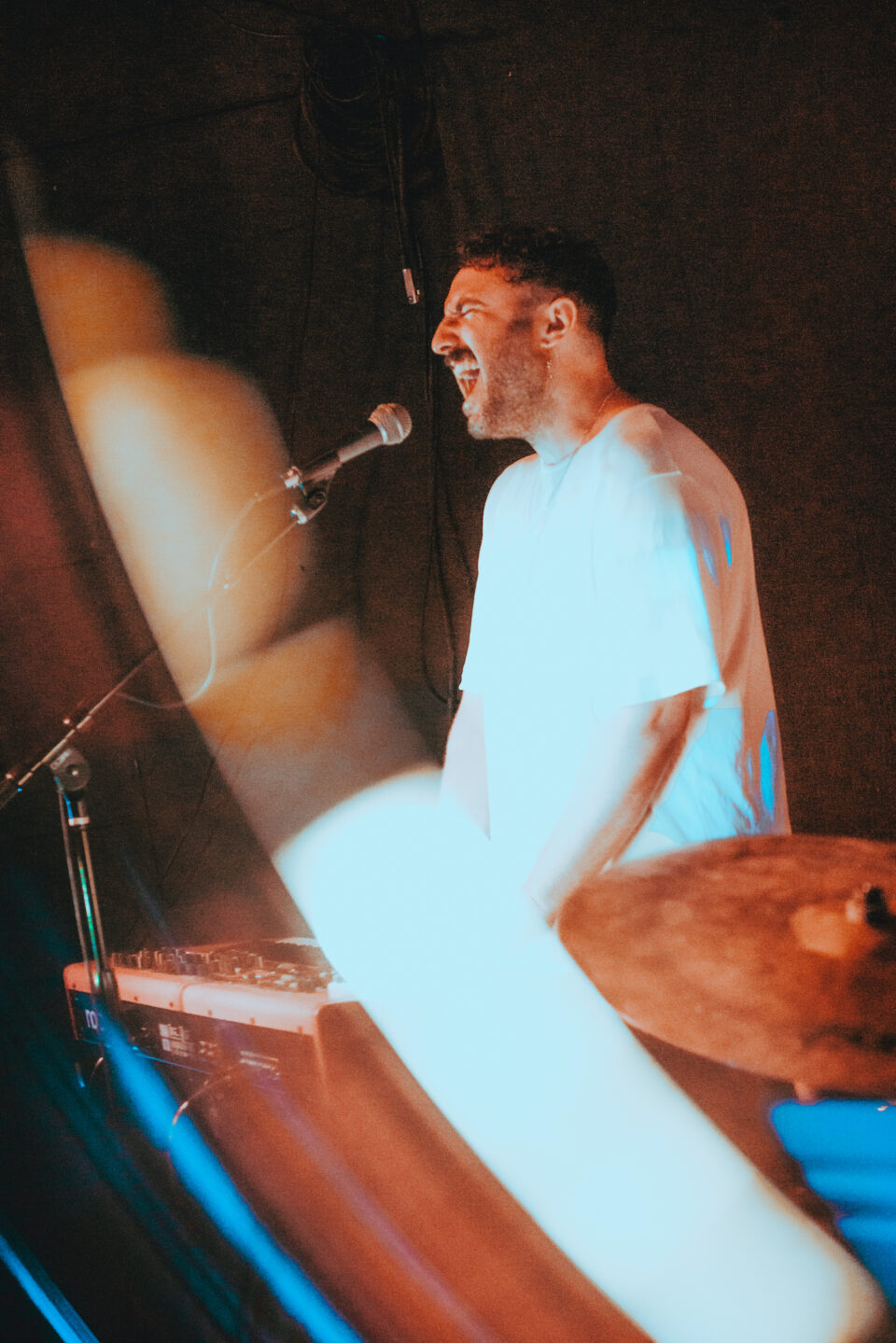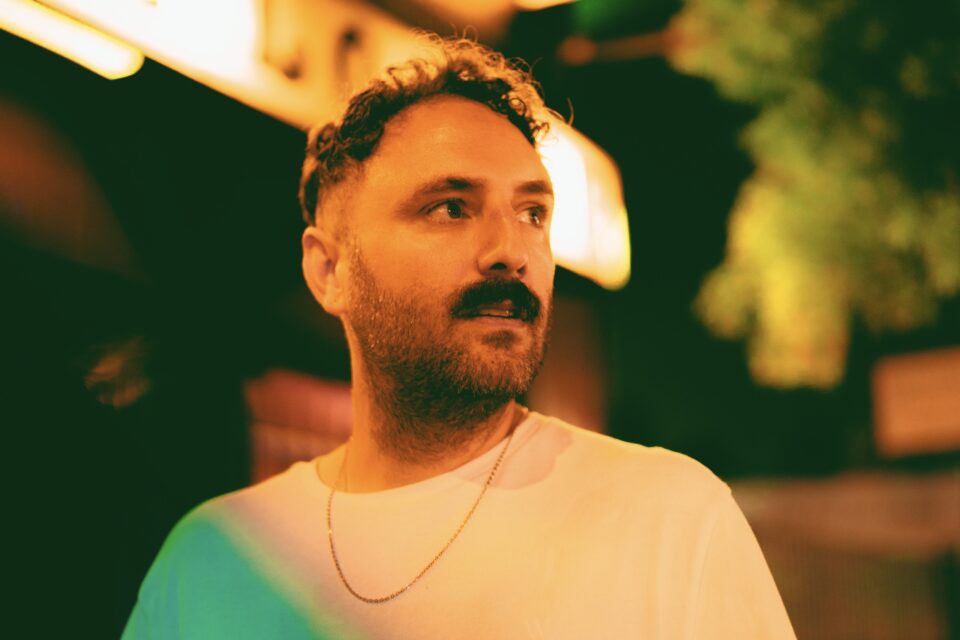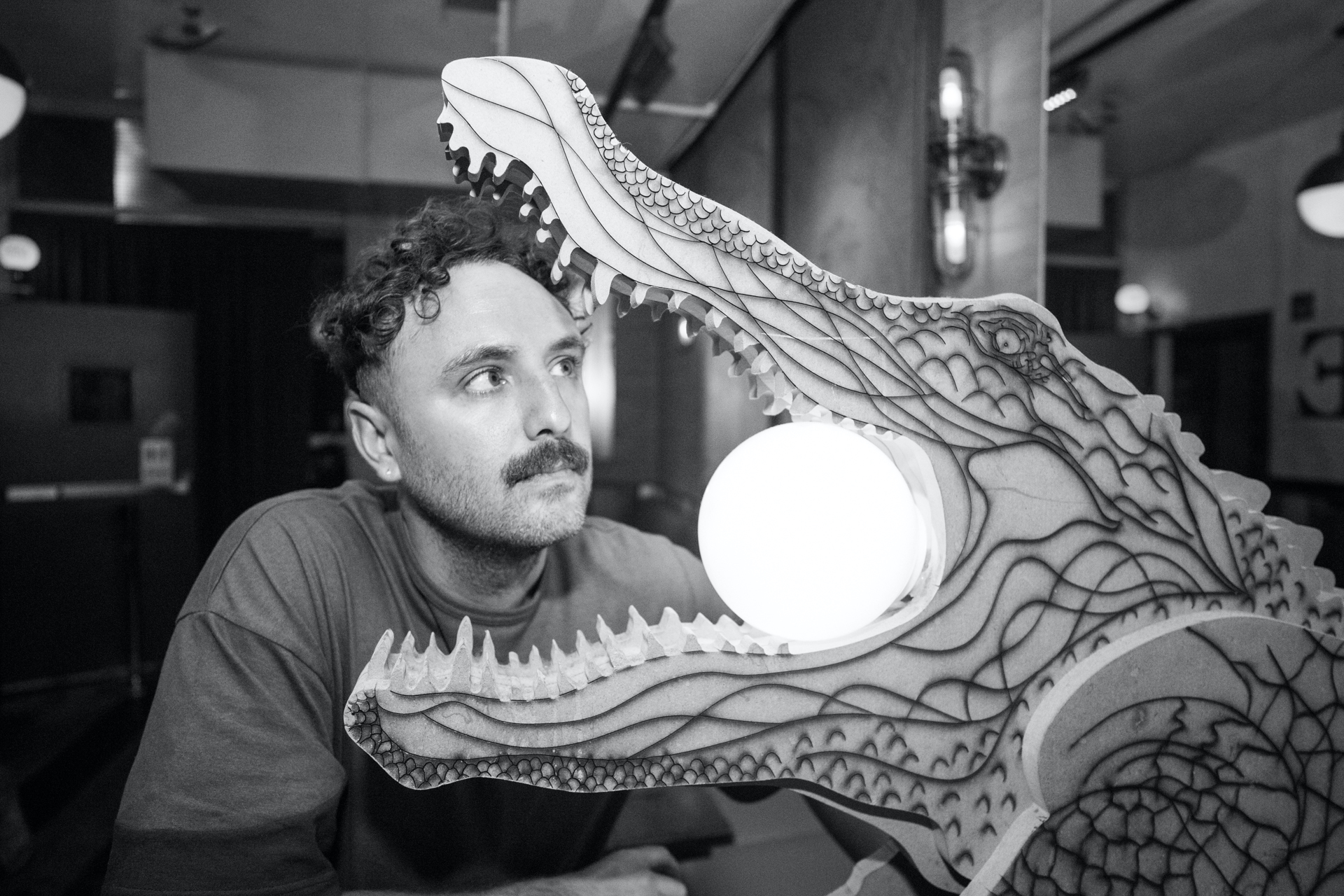2022 is a year of changes for Kelcey Ayer. The Local Natives co-frontperson, who’s getting ready to drop Second Life, his sophomore solo album under the moniker Jaws of Love, is more than ready for these changes.
Ayer is preparing to welcome his first child in January—something he’d prepared for twice before, but both pregnancies were cut short due to miscarriages. He’s put these very personal experiences into songs on Second Life with the intention of removing the stigma of speaking about the pain of these losses. The second single from Second Life, “Rainbow Baby,” a reference to the baby that comes after miscarriage, is one, “The Heist” is another.
At the same time, he’s leaning into his identity as Colombian-American after being lumped into the white-indie-dude slot for the majority of his 15-year career with Local Natives. When he takes a break from rehearsing with the band to discuss Second Life, it turns out the musician—who’s also had his own television show that now lives on as a podcast, and who moonlights as a comedian and actor—is just as revealing in his interviews as he is in his songs.
Did “Rainbow Baby” just come to you, or did you set about to purposely write about your experience with miscarriages?
I’ve always been pretty confessional in my songwriting. It’s a gift that I can process the shitty parts of life through writing songs about them. I feel really grateful to have that. The more I write about my own personal story, it feels, the more people can relate. As a person I’m an open book. As a songwriter, that becomes a part of it. How hard it’s been was a huge part of me and my wife’s new chapter of us trying to have a kid. It’s a couple of years now that we’ve been trying, so it just felt right to channel that into music.
“It’s so tough to try to deal with this stuff on your own, by yourself, silently, in pain. If I could help open that conversation up a little bit, I feel proud and grateful for being able to do that.”
Did you talk to her about releasing songs about your losses?
We had lots of conversations about having a song about it. I wrote the song. I showed her. She’s been with me since 2008, basically the beginning of Local Natives. We’ve been married 10 years in August. We’ve had a bunch of talks about how to explain our story. She’s been lockstep with me in any way that we’ve talked about the song. It was with her blessing that I released it.
I can only tell the story through my lens, as the father that I couldn’t be. I didn’t want to make it seem like I’m speaking for her or I’m speaking for women or anything like that, because obviously that’s not my place at all. I’ll never understand the hurt and the sorrow and the pain that she’s gone through. It feels like very few people talk about this subject. It’s so tough to try to deal with this stuff on your own, by yourself, silently, in pain. I feel like it doesn’t have to be like that. If I could help open that conversation up a little bit, I feel proud and grateful for being able to do that.

It’s very difficult for fathers-to-be because, in a weird way, you almost feel like you don’t have the right be sad or own the miscarriage in the same way as the mom-to-be.
It’s so heartbreaking that you don’t get to have answers, and you don’t get to have a say in what happens inside your own body. That’s just so unimaginable. What do you do with that pain and that frustration? I can only speak to our situation. I think my wife handled it as best she could and I’m really proud of her for how far she’s come with it, because she has come a long way.
Do you feel like you have to keep material this personal for Jaws of Love rather than Local Natives?
I’m always writing for Local Natives and for Jaws of Love. Some things feel better for one project, other things feel better for the other one, and some things fall in between. When I was focusing on the Jaws of Love record, it was the same time we had gone through our first loss, which is what “Rainbow Baby” is about. To get this vulnerable and this confessional, Jaws of Love has more space to dive deep.
“Sometimes I love a song so much, it doesn’t feel like there’s room for someone to change it into something else. Anything I bring the Local Natives needs to be malleable and ready to change into whatever it’s going to be.”
Does Local Natives not afford you that space?
There’s time and space in Local Natives to do that, but Jaws of Love is such a more personal project because it’s only me. Local Natives is the combination of five unique voices, five unique viewpoints. For something as dense and as complicated of a topic as pregnancy and infancy loss, I feel Jaws of Love just made more sense.
I had this chord progression for the longest time, and I loved that it was long and the chords were always changing underneath this one melody that was going on and on. Sometimes I love a song so much, it doesn’t feel like there’s room for someone to change it into something else. Anything I bring the Local Natives needs to be malleable and ready to change into whatever it’s going to be. If there’s something that feels like a part of who I am and I can’t see it going any other way, that will end up being a Jaws of Love thing.

What are some of the other topics you’ve written about on the album?
I made a lot of the music for this album and for the Patricia EP I put out in May in honor of my mother who passed away 11 years ago. She was Colombian, and I feel like ever since she passed away I’ve been losing my Colombian side. Over quarantine, I had an awakening of realizing my identity. I’ve always thought of myself as just this white dude. But I’m realizing, maybe, I’m totally white-passing and I benefit from all that privilege, for sure—but I’m not white. I’m mixed-race. I’ve had these experiences that if you’re growing up in a white family, you’re not having.
Being around Colombian people, being around that culture, being around speaking Spanish all the time—you don’t see those things when you look at me, but I’ve had all these kinds of realizations of who I am and that came out through that EP. On this record, I was grappling with trying to become a parent myself. And it’s interesting that they kind of came together, but they’re released separately.
“I feel impostor syndrome even just to say I’m mixed race... I’m just in a state of mid-figuring-it-out and I’m enjoying not knowing a little bit, that I get to create the version of whoever I am.”
Is everything coming full circle?
It’s a lot about looking toward the future and trying to see what it would be like to have this new era, this new rebirth or reawakening. All these kinds of thoughts started coming into my mind. Even with these losses, I’m imagining this new life, this “second life” of imagining who the next version of myself was going to become. I thought I was going to be a dad two years ago. But it just keeps morphing into something different. A lot of the songs are touching on some version of that, of what a new version of yourself would be.
Is that why you have a song in Spanish on the album?
I sang some stuff in Spanish for the first time ever on this track called “Angelica” on the record and that got me so excited to take a step further into unknown territory. I feel impostor syndrome even just to say I’m mixed race. That’s been my own hurdle of trying to figure out how that fits, and I’m just in a state of mid-figuring-it-out and I’m enjoying not knowing a little bit, that I get to create the version of whoever I am. I don’t know how many mixed-race, Colombian, white, indie-rock singer-people there are and what they’re supposed to do, but I’m just following my gut. And it’s fun.
In 2022, I think we’re supposed to be feeling our way around these issues. No one’s going to do it perfectly and no one has the right answers, but the more comfortable we get with exploring the unexplored uncomfortable places, it’s just better for everybody. FL







